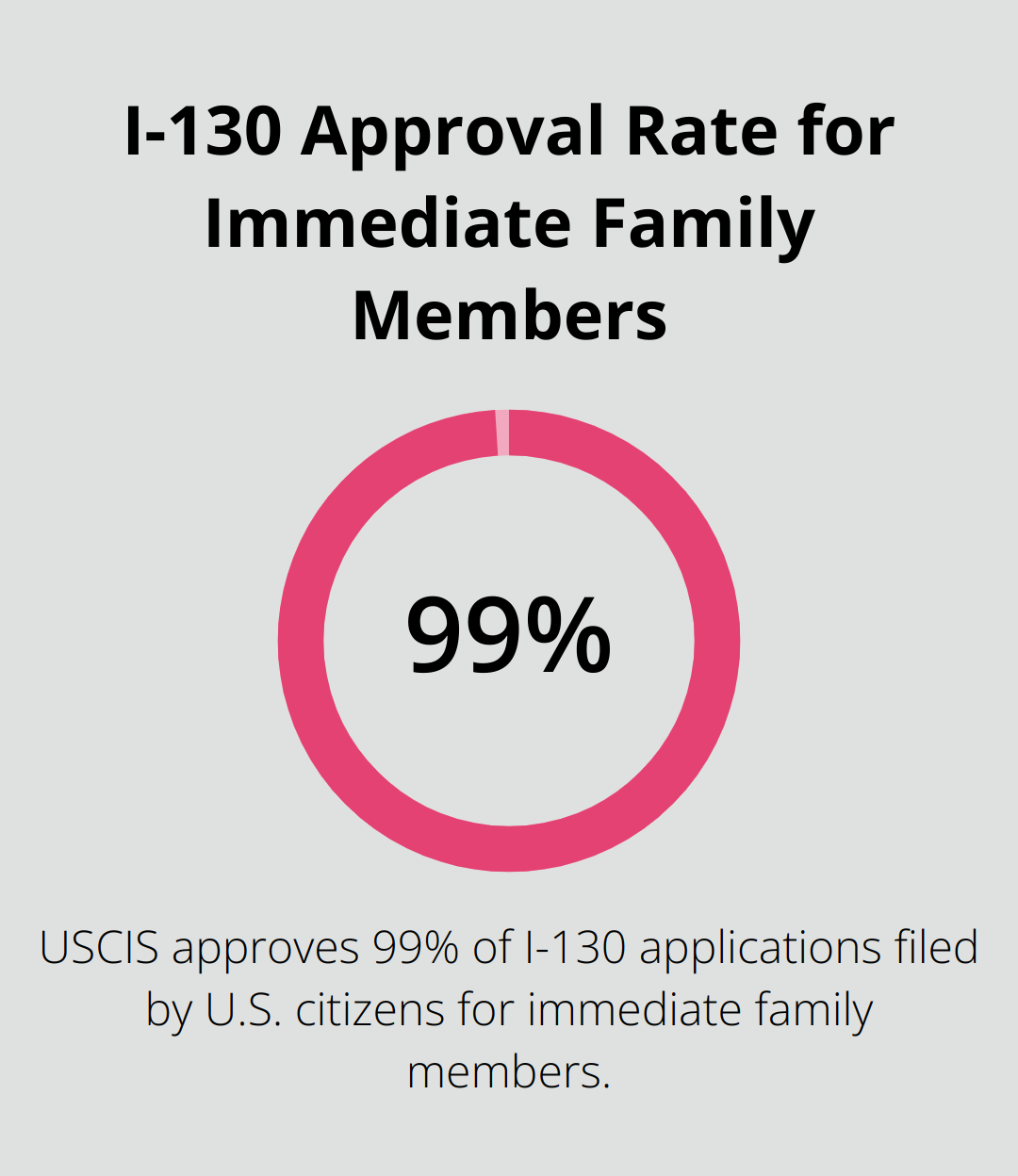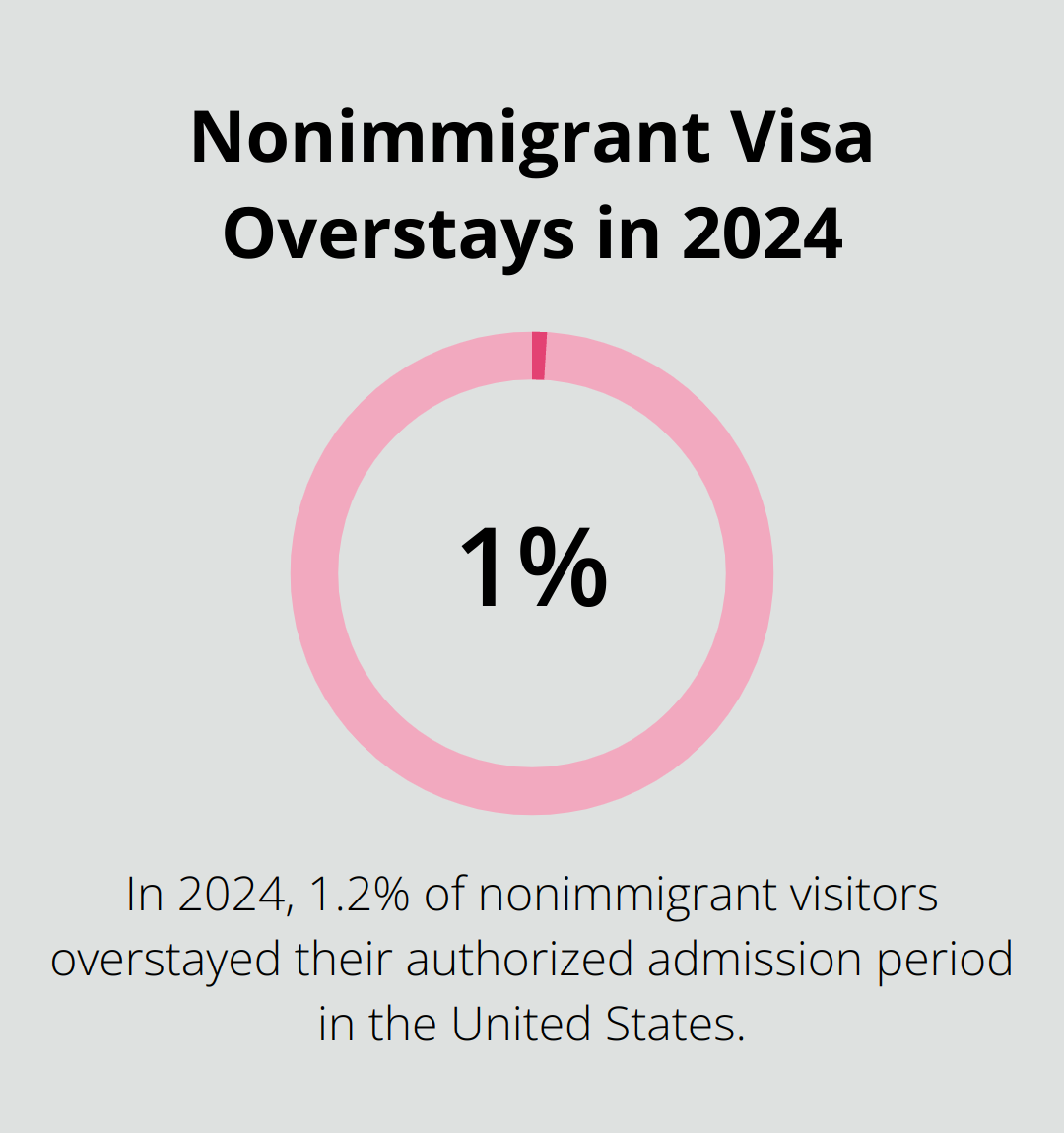
Can I-130 Be Approved Without Eligibility for AOS?
At Law Offices of Jeffrey A. Thompson, we often encounter cases where an I-130 is approved but the beneficiary is not eligible for adjustment of status. This situation can be confusing for many immigrants and their families.
Understanding the relationship between Form I-130 and the adjustment of status process is crucial for navigating the U.S. immigration system. In this post, we’ll explore the scenarios where an I-130 can be approved without AOS eligibility and what it means for your immigration journey.
What Are I-130 and AOS?
Form I-130: The First Step
Form I-130 (Petition for Alien Relative) serves as the initial document in the U.S. immigration process. U.S. citizens or lawful permanent residents use this form to sponsor eligible family members for immigration. USCIS data shows an impressive approval rate of over 99% for I-130 applications, particularly those filed by U.S. citizens for immediate family members.

The primary function of Form I-130 is to establish a qualifying relationship between the petitioner and the beneficiary. It does not grant immediate immigration benefits or status but acts as a prerequisite for subsequent steps in the immigration process. Processing times for an I-130 petition average around 14 months, but can extend up to 35 months for relatives of green card holders residing abroad.
Adjustment of Status (AOS) Explained
Adjustment of status is the process that you can use to apply for lawful permanent resident status (also known as applying for a Green Card) without returning to their home country. It’s important to note that not all I-130 beneficiaries qualify for AOS; some may need to pursue consular processing instead.
The I-130 and AOS Connection
While I-130 approval is necessary for most family-based green card applications, it doesn’t guarantee AOS eligibility. Several factors can affect an individual’s ability to adjust status, including:
- Current immigration status
- Method of entry into the U.S.
- Grounds of inadmissibility (if any)
For immediate relatives of U.S. citizens (spouses, unmarried children under 21, and parents), visa numbers are always available. This availability typically allows them to file for AOS concurrently with the I-130 petition or immediately after its approval. However, family preference categories often face a waiting period due to annual visa limits.
Complexities in the Process
The immigration process can present numerous challenges. Many cases involve an approved I-130, but the beneficiary isn’t immediately eligible for AOS. This situation highlights the intricacies of immigration law and underscores the value of professional guidance.
Each immigration case is unique, with its own set of circumstances and potential obstacles. Understanding the interplay between I-130 approval and AOS eligibility is essential for successfully navigating your immigration journey. As we move forward, we’ll explore specific scenarios where an I-130 can be approved without immediate AOS eligibility, shedding light on the various paths immigrants may encounter in their quest for permanent residency.
When Can I-130 Be Approved Without AOS Eligibility?
At Law Offices of Jeffrey A. Thompson, we encounter numerous cases where an I-130 petition receives approval, but the beneficiary cannot immediately pursue Adjustment of Status (AOS). This situation occurs more frequently than many people realize and manifests in several specific scenarios.
Beneficiaries Living Outside the United States
One straightforward case involves beneficiaries who reside abroad. In this situation, the I-130 can receive approval, but the beneficiary must pursue consular processing instead of AOS. This process requires the applicant to apply for an immigrant visa at a U.S. embassy or consulate in their home country.
The U.S. Department of State reports that in fiscal year 2024, consular processing resulted in the issuance of over 500,000 immigrant visas. This statistic underscores the importance of this pathway for many immigrants.
Visa Availability for Preference Categories
For family preference categories, visa availability plays a pivotal role. The U.S. government imposes annual limits on the number of visas available for these categories. Consequently, even with an approved I-130, beneficiaries may face extended waiting periods before they can apply for a green card.
The Visa Bulletin, a monthly publication by the U.S. Department of State, provides essential information on current wait times. For example, as of June 2025, F4 category applicants (siblings of U.S. citizens) from the Philippines face a staggering wait time of over 20 years due to visa retrogression.
Immediate Relatives Facing Inadmissibility Issues
Even immediate relatives of U.S. citizens, who typically have visas immediately available, may find themselves ineligible for AOS despite an approved I-130. This often stems from inadmissibility grounds such as previous immigration violations or criminal history.
In these cases, the approved I-130 remains valid, but the beneficiary may need to seek a waiver of inadmissibility before they can proceed with their green card application. USCIS data reveals that in 2024, approximately 15% of AOS applications received initial denials due to inadmissibility issues.
Temporary Protected Status (TPS) Holders
Individuals with Temporary Protected Status present a unique case. While they may have an approved I-130, recent court decisions have complicated their ability to adjust status within the U.S. The circuit split on this issue means that TPS holders’ eligibility for AOS can depend on their geographic location within the U.S.
A 2024 report from the Congressional Research Service indicated that over 300,000 TPS holders (a significant portion of the TPS population) could potentially feel the impact of these conflicting court decisions.

Steps for Beneficiaries to Consider
If you find yourself with an approved I-130 but ineligible for AOS, consider these actions:
- Seek advice from an experienced immigration attorney to understand your options.
- If you live abroad, start preparing for consular processing.
- If you fall under a preference category, check the Visa Bulletin regularly.
- For those with inadmissibility issues, explore potential waiver options.
- TPS holders should stay informed about ongoing legal developments.
These scenarios illustrate the complex interplay between I-130 approval and AOS eligibility. An approved I-130 marks a significant milestone in the immigration journey, even if AOS doesn’t immediately follow. The next section will explore the factors that influence I-130 approval and AOS eligibility in greater detail.
What Impacts I-130 Approval and AOS Eligibility?
The Visa Bulletin and Priority Dates
The Visa Bulletin, a monthly publication by the U.S. Department of State, determines when an immigrant visa becomes available. This directly affects AOS eligibility, particularly for family preference categories.
Priority dates are essential in this process. The date USCIS receives your I-130 petition becomes your priority date (your place in line for a visa). For some countries and categories, the wait can be substantial.
You should check the Visa Bulletin regularly and stay informed about your priority date. The National Visa Center (NVC) processed over 500,000 immigrant visa cases in fiscal year 2024, which highlights the volume of applications in the system.
Criminal History and Inadmissibility
A clean criminal record significantly improves your chances of I-130 approval and AOS eligibility. However, certain criminal convictions can make an applicant inadmissible, which complicates the process even with an approved I-130.
Criminal inadmissibility grounds can significantly impact immigration cases. As of August 2024, Immigration Judges denied 45% of asylum cases, with the number of denials climbing rapidly and steadily.
If you have a criminal record, you might need to seek a waiver of inadmissibility. The success rate for these waivers varies, with USCIS approving about 70% of I-601 waiver applications in 2024.
Maintaining Lawful Status
For those already in the U.S., maintaining lawful status is paramount for AOS eligibility. Overstaying a visa or violating its terms can lead to serious complications.
The Department of Homeland Security estimated that in 2024, approximately 1.2% of nonimmigrant visitors overstayed their authorized admission period. This seemingly small percentage translates to thousands of individuals potentially facing barriers to AOS.

Certain violations, like working without authorization, can be particularly detrimental. In such cases, even an approved I-130 may not salvage AOS eligibility, which necessitates consular processing or other complex legal strategies.
Professional Legal Guidance
Understanding these factors is important for anyone pursuing family-based immigration. The Law Offices of Jeffrey A. Thompson recommends seeking professional legal guidance to navigate these complexities effectively. Each case is unique, and what applies to one situation may not apply to another. You should stay informed, be proactive, and seek expert advice to ensure the best possible outcome for your immigration journey.
Final Thoughts
The U.S. immigration process presents numerous challenges, especially when an I-130 is approved but not eligible for adjustment of status. This situation highlights the complex nature of immigration law and the need for a thorough understanding of each step. The approval of an I-130 petition marks a significant milestone in the immigration journey, but it doesn’t guarantee immediate AOS eligibility.
Beneficiaries in this position must stay informed and take proactive steps. They should check the Visa Bulletin regularly, maintain lawful status if in the U.S., and address any potential inadmissibility issues. Understanding the specific requirements for their immigration category will help them prepare for the next phases of their journey, whether it involves consular processing or waiting for visa availability.
Professional legal guidance is highly recommended due to the complexities involved. At Law Offices of Jeffrey A. Thompson, we specialize in immigration law and provide expert assistance in navigating these challenging scenarios. Our team helps clients understand their options, overcome legal hurdles, and achieve their immigration goals (even when facing an I-130 approved but not eligible for adjustment of status situation).


